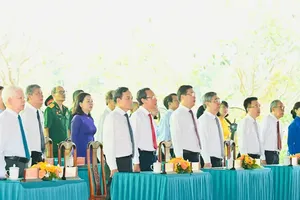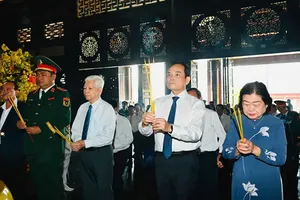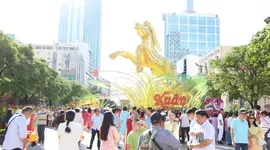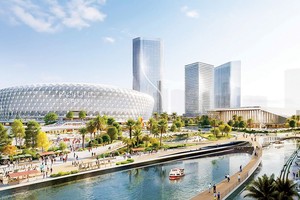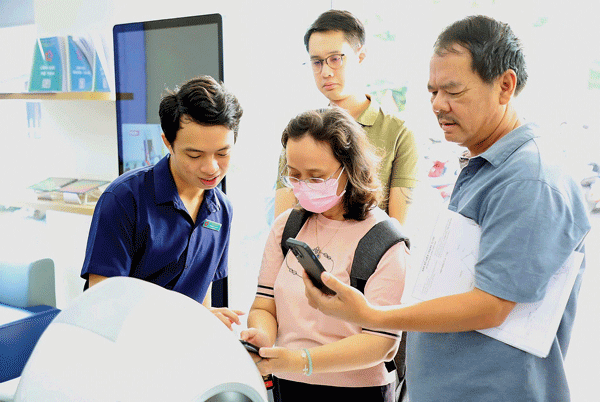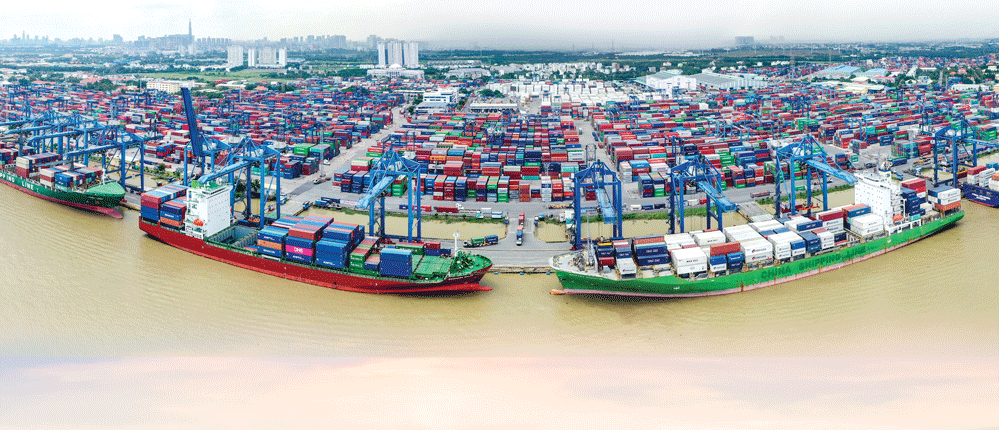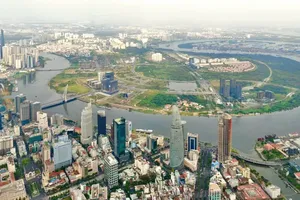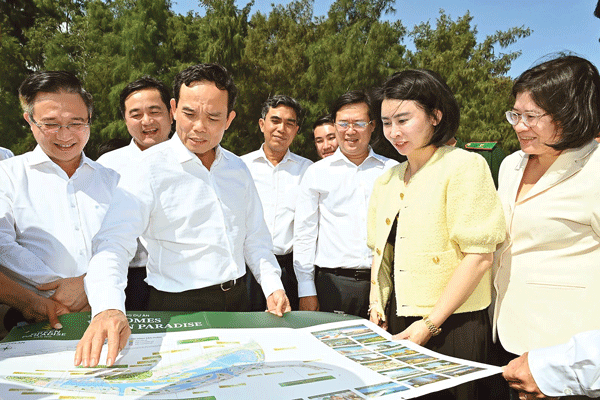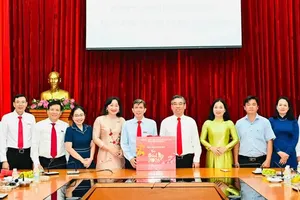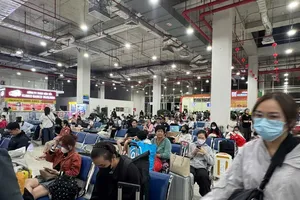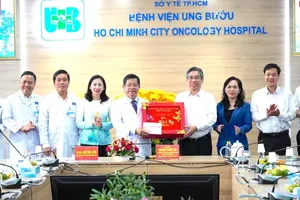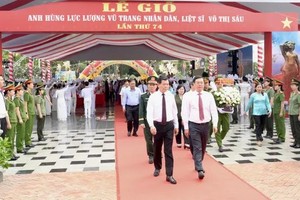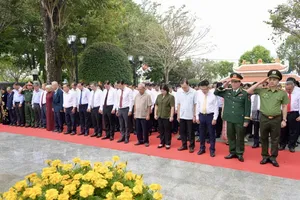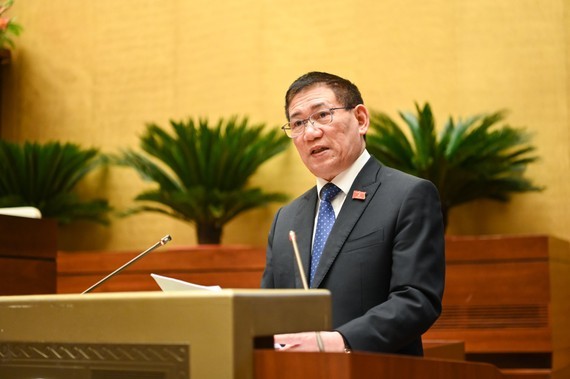 Minister of Finance Ho Duc Phoc. (Photo: SGGP)
Minister of Finance Ho Duc Phoc. (Photo: SGGP)
The next step is for HCMC to evaluate and summarize the implementation of the Politburo's Resolution No.16-NQ/TW dated August 10, 2012, on the directions and tasks for the development of HCMC until 2020 and the results of the implementation of Resolution No.54, and report to the Politburo to allow HCMC to pilot some specific and outstanding mechanisms and policies to meet the city's development requirements in the coming time.
After five years of implementing Resolution No.54/2017/QH14, HCMC had achieved many outstanding results, the Minister of Finance said.
Specifically, except for the years severely affected by the Covid-19 pandemic, HCMC's economy continuously posted high growth rates, with an average annual growth rate of 7.72 percent in the 2016-2019 period, higher than the rate of 7.22 percent of the 2011-2015 period.
After the HCMC's economy slowed down to 1.39 percent in 2020 and declined (-6.78 percent) in 2021 due to the impact of the Covid-19 pandemic, the first months of 2022 recorded a recovery of 1.87 percent in the first quarter, 5.73 percent in the second quarter, and average growth of 3.82 percent in the first six months. The ratio of social investment capital to GRDP increased over time. During the 2016-2020 period, it reached an average of 32.29 percent, higher than the annual average rate of 31.07 percent in the 2011-2015 period. Notably, the quality of economic growth and the contribution of total factor productivity to GRDP have also continuously increased over the years. During the 2016-2020 period, it touched an average of 38.42 percent, higher than the annual average rate of 33.15 percent in the 2011-2015 period.
With the implementation of the provisions of Resolution No.54, the implementation progress of Group A projects has been accelerated faster than having to submit to central agencies for appraisal. The city has also been more active in issuing local government bonds, borrowing from domestic financial institutions, other domestic organizations, and re-lending of foreign Government loans to supplement resources for investment and development spending. Taking the initiative to consider changing the purpose of projects using more than 10 hectares of rice land has helped to shorten the implementation time and speed up the implementation of projects, ensuring that the implementation of the approved annual land use plan is effective. Meanwhile, the adjustment to increase the environmental protection fees for industrial wastewater has had a significant impact on environmental protection awareness and behavior for organizations and individuals in the area.
Especially, the policy of spending additional income has been implemented publicly and transparently, contributing to improving the lives of officials, civil servants, and public employees, initiating creative labor spirit, improving work efficiency, and consolidating and improving the quality of the State apparatus in all fields. The implementation of strengthening the authorization mechanism for specialized agencies and localities has brought into full play its effectiveness, in line with the socio-economic characteristics and strengths of each locality in the city, promoting the responsibility of the leader.
However, many contents of Resolution No.54/2017/QH14 are still behind schedule. Some mechanisms have been implemented, but their effectiveness remains low. For instance, policies to attract experts, scientists, and talented people have not been applied much.
After five years of implementing Resolution No.54/2017/QH14, HCMC had achieved many outstanding results, the Minister of Finance said.
Specifically, except for the years severely affected by the Covid-19 pandemic, HCMC's economy continuously posted high growth rates, with an average annual growth rate of 7.72 percent in the 2016-2019 period, higher than the rate of 7.22 percent of the 2011-2015 period.
After the HCMC's economy slowed down to 1.39 percent in 2020 and declined (-6.78 percent) in 2021 due to the impact of the Covid-19 pandemic, the first months of 2022 recorded a recovery of 1.87 percent in the first quarter, 5.73 percent in the second quarter, and average growth of 3.82 percent in the first six months. The ratio of social investment capital to GRDP increased over time. During the 2016-2020 period, it reached an average of 32.29 percent, higher than the annual average rate of 31.07 percent in the 2011-2015 period. Notably, the quality of economic growth and the contribution of total factor productivity to GRDP have also continuously increased over the years. During the 2016-2020 period, it touched an average of 38.42 percent, higher than the annual average rate of 33.15 percent in the 2011-2015 period.
With the implementation of the provisions of Resolution No.54, the implementation progress of Group A projects has been accelerated faster than having to submit to central agencies for appraisal. The city has also been more active in issuing local government bonds, borrowing from domestic financial institutions, other domestic organizations, and re-lending of foreign Government loans to supplement resources for investment and development spending. Taking the initiative to consider changing the purpose of projects using more than 10 hectares of rice land has helped to shorten the implementation time and speed up the implementation of projects, ensuring that the implementation of the approved annual land use plan is effective. Meanwhile, the adjustment to increase the environmental protection fees for industrial wastewater has had a significant impact on environmental protection awareness and behavior for organizations and individuals in the area.
Especially, the policy of spending additional income has been implemented publicly and transparently, contributing to improving the lives of officials, civil servants, and public employees, initiating creative labor spirit, improving work efficiency, and consolidating and improving the quality of the State apparatus in all fields. The implementation of strengthening the authorization mechanism for specialized agencies and localities has brought into full play its effectiveness, in line with the socio-economic characteristics and strengths of each locality in the city, promoting the responsibility of the leader.
However, many contents of Resolution No.54/2017/QH14 are still behind schedule. Some mechanisms have been implemented, but their effectiveness remains low. For instance, policies to attract experts, scientists, and talented people have not been applied much.
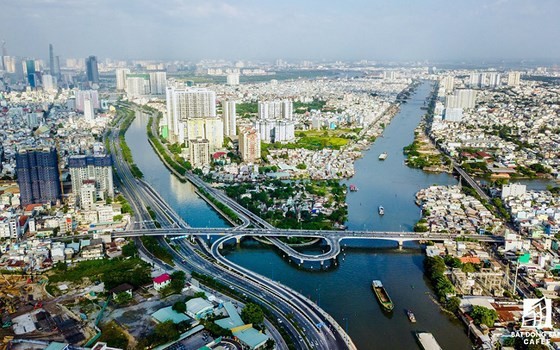 A corner of HCMC
A corner of HCMC
Notably, as for the specific financial mechanism to help the city mobilize more resources, in the 2018-2022 period, there were only revenues from bonuses and reinvestment from the central budget (more than VND1.65 trillion), equitization and divestment (nearly VND1.79 trillion), issuance of local government bonds (VND2.8 trillion), re-lending of foreign Government loans (nearly VND11.39 trillion), and environmental protection fees for industrial wastewater (VND132.6 billion). Meanwhile, potential sources with large revenues have not been implemented, such as the equitization of State-owned enterprises and exploitation of property and land. Some mechanisms and policies have not been specified, or are waiting for guidance documents, so the implementation is slow. The work of guiding the implementation of regulations on assessment and classification to pay extra income has not kept pace with the developments of reality.

